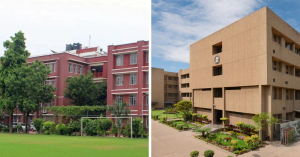When students consider which college or university to attend, they often focus on factors like academic programs, tuition costs, and campus amenities. While these are undeniably important, one critical element that can significantly shape a student's academic experience and future opportunities is the college's location. College location plays a crucial role in determining access to internships, job opportunities, cultural exposure, networking possibilities, and even personal well-being.
The geographical setting of a college, whether urban, suburban, or rural, can provide unique advantages and challenges. From access to industries and employment markets to the cost of living and the quality of life, location influences both the academic and social aspects of student life. In this article, we will explore how the location of a college impacts student opportunities, highlighting why this factor should not be overlooked when choosing an institution for higher education.
College Location and Internship/Job Opportunities
One of the most significant ways college location influences student success is by providing access to internships and job opportunities. For students, internships are essential stepping stones into the professional world. They offer practical experience, networking connections, and an understanding of industry expectations, which are crucial for building a successful career. The availability and variety of internships often depend on a college's proximity to industry hubs, corporations, and businesses.
Urban colleges, particularly those located in major cities such as New York, Los Angeles, or Chicago, provide students with immediate access to a wide array of industries. Students in urban areas can benefit from the presence of multinational corporations, start-ups, and a broad range of industries such as finance, media, healthcare, technology, and the arts. The close proximity allows students to pursue part-time jobs, internships, and co-op programs during the academic year, giving them hands-on experience while still attending classes.
Suburban colleges, while somewhat removed from city centers, still offer access to opportunities within commuting distance. Many of these institutions develop strong relationships with local businesses, often offering internships that may be more tailored to specific fields or industries, creating a more personalized experience for students.
On the other hand, rural colleges may not have as many immediate opportunities for internships, but this doesn’t necessarily mean a lack of professional experience. Some rural institutions have strong ties to niche industries like agriculture, environmental science, and renewable energy, offering unique experiences not available in urban settings. Additionally, rural colleges often place a strong emphasis on experiential learning, helping students to seek internships during summer breaks or offering remote work opportunities that align with their academic pursuits.
Ultimately, the location of a college can shape the type of job and internship opportunities available to students, directly influencing their career prospects after graduation.
Cultural Exposure and Networking
Another significant advantage of attending a college in a diverse or metropolitan area is the exposure to a wide range of cultures, ideas, and perspectives. In an increasingly globalized world, cultural competency is a valuable skill, and studying in a culturally rich environment can help students develop a broader worldview. Colleges located in cities with diverse populations provide students with opportunities to interact with people from different backgrounds, both within and outside of the academic setting.
Urban locations often host cultural events, festivals, and conferences, giving students exposure to a variety of perspectives and experiences that they may not encounter in more homogenous areas. This diversity can also extend into the classroom, where students may engage in discussions with peers who have different cultural, social, and political perspectives, thus enriching their academic experience.
In terms of networking, large cities and urban institutions offer access to extensive professional networks. From attending conferences and industry events to networking with alumni, students in urban colleges can connect with professionals across various sectors, which can open doors for future job opportunities. Many universities host guest speakers, invite industry leaders for workshops, and connect students with alumni networks that are often stronger and more active in urban environments.
Even students attending suburban or rural colleges can benefit from organized trips to nearby cities for networking events or cultural experiences. However, the immediacy of being in an urban location provides daily exposure to these opportunities, which can be crucial for building professional and personal networks that last long after graduation.
Cost of Living and Financial Impact
The cost of living in a college’s surrounding area is another critical factor that can significantly impact students’ financial situation and overall well-being. Urban areas, while rich in opportunities, often come with higher living expenses. Cities like San Francisco, New York, and Boston have notoriously high costs of living, which can place an additional financial burden on students, especially those living off-campus. Housing, transportation, and even everyday expenses such as food and entertainment can be more expensive in major cities compared to suburban or rural areas.
Suburban colleges often offer a middle ground, where students can still access urban opportunities without facing the exorbitant cost of city living. In these settings, students might be able to commute to internships and job opportunities in nearby cities while enjoying a more affordable cost of living on or near campus.
Rural colleges, by contrast, generally offer the most affordable living options. Housing tends to be significantly cheaper, and the overall cost of living is lower compared to urban or suburban areas. This can help students manage their budgets more effectively and reduce the amount of student loan debt they accumulate. However, rural settings may also lack the job opportunities available in cities, which means students may have to travel farther or seek remote work opportunities to gain professional experience.
The financial impact of college location is not limited to tuition and fees, but also includes the hidden costs associated with daily living. Therefore, it’s important for students to consider not only the academic and professional opportunities of a college’s location but also how its surrounding area aligns with their financial situation and long-term financial goals.
Impact on Student Life and Well-being
College location also has a significant influence on student life, mental health, and overall well-being. Urban campuses often offer a vibrant social life, with access to cultural events, nightlife, restaurants, and entertainment options. This can enhance the college experience by providing students with a well-rounded lifestyle that balances academics with social activities. However, the fast-paced nature of city life can also be overwhelming for some students, particularly those who prefer quieter, less hectic environments.
Suburban campuses often offer a balance between urban excitement and rural tranquility. Students can enjoy the social aspects of college life while still having access to green spaces, quieter study areas, and a slower pace of life. This can create an environment that is conducive to both social engagement and academic focus.
Rural colleges, meanwhile, provide a more serene setting. With less distraction and fewer external activities, students in rural areas may find it easier to focus on their studies. The natural surroundings and close-knit campus communities can foster a strong sense of belonging and provide mental health benefits through access to outdoor activities like hiking or skiing. However, the lack of social opportunities outside of campus may be a drawback for students who thrive in more dynamic settings.
Ultimately, the location of a college can have a profound impact on a student’s mental health, social life, and overall well-being, all of which play an important role in their academic success.
Conclusion
Choosing a college is about more than just academics—location matters. The geographical setting of a college influences access to internships, job opportunities, cultural exposure, networking, cost of living, and quality of life. Urban colleges offer diverse experiences and professional opportunities, while suburban and rural campuses provide more affordable living and quieter environments conducive to focused study.
As students weigh their college options, they should consider how location aligns with their career goals, financial situation, and personal preferences. A college’s location can shape not only their academic experience but also their future career path and overall well-being. In the end, the right college location is one that supports both personal and professional growth.






